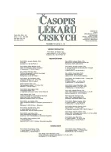-
Články
- Vzdělávání
- Časopisy
Top články
Nové číslo
- Témata
- Kongresy
- Videa
- Podcasty
Nové podcasty
Reklama- Kariéra
Doporučené pozice
Reklama- Praxe
How to read critically a scientific paper
Authors: Pavel Mohr 1,2; Cyril Höschl 1,2; Jan Volavka 3
Authors place of work: Psychiatrické centrum Praha 1; 3. lékařská fakulta, Univerzita Karlova Praha 2; New York University School of Medicine 3
Published in the journal: Čas. Lék. čes. 2012; 151: 476-479
Category: Speciální sdělení
Summary
Background.
Effort to follow the development in various fields of medicine is being hindered by enormous growth of information output. The vast amount of data makes it difficult to figure out what is really important. Psychiatrists and other physicians tend to read scientific papers superficially, relying excessively on abstracts. We addressed this problem by teaching critical appraisal of individual articles.Methods.
We developed a 23-item appraisal instrument to assess various aspects of papers on psychopharmacology. The appraisal form was used to evaluate individual articles during a series of workshops with psychiatric trainees. The results were collected with an electronic voting system and subsequently discussed with experienced tutors who also provided key ratings.Results.
The total of 58 trainees participated at three workshops, six publications were analyzed. Evaluation of the papers yielded heterogeneous results reflecting variations of the participants’ theoretical background as well as varied quality of the publications. We present detailed analysis of one paper as an illustrative example.Conclusions.
Our experience showed that the discussion format and the voting system with immediate feedback stimulate active involvement of the participants. Administration of the structured appraisal instrument that can be easily adapted for other medical publications may enhance understanding and critical appraisal of scientific texts.Key words:
medical information, publications, psychopharmacology, teaching.
Zdroje
1. Deshazo JP, t al. Publication rends n the medical informatics literature: 20 years of „Medical nformatics“ in eSH. BMC Med Inform Decis Mak 009; 9 : 7.
2. Albayrak O, et al. Bibliometric assessment of publication output of child and adolescent psychiatric/psychological affiliations between 2005 and 2010 based on the databases PubMed and Scopus. Eur Child Adolesc Psychiatry 2012; 21 : 327–337.
3. Pus PE. Vliv farmaceutického průmyslu na vzdělávání lékařů. Psychiatrie 2004; 8 : 332.
4. Heres S, et al. Why olanzapine beats risperidone, risperidone beats quetiapine, and quetiapine beats olanzapine: an exploratory analysis of head-to-head comparison studies of second-generation antipsychotics. Am J Psychiatry 2006; 163 : 185–194.
5. Kasper S, et al. Efficacy and safety of aripiprazole vs. haloperidol for long-term maintenance treatment following acute relapse of schizophrenia. Int J Neuropsychopharmacol 2003; 6 : 325–337.
6. Giegling I, et al. Interaction of haloperidol plasma level and antipsychotic effect in early phases of acute psychosis treatment. J Psychiatr Res 2010; 44 : 487–492.
7. Mohr P, et al. Teaching critical appraisal of articles on psychopharmacology. Acad Psychiatry 2012; 36 : 114–117.
8. Chengappa KN, et al. Clozapine: its impact on aggressive behavior among patients in a state psychiatric hospital. Schizophr Res 2002; 53 : 1–6.
9. Dose M, et al. Treating schizophrenia patients with antipsychotics in a naturalistic setting: a retrospective chart review. Psychiatrie 2008; 12 : 197–200.
10. Jones PB, et al. Randomized Controlled Trial of the Effect on Quality of Life of Second - vs First-Generation Antipsychotic Drugs in Schizophrenia: Cost Utility of the Latest Antipsychotic Drugs in Schizophrenia Study (CUtLASS 1). Arch Gen Psychiatry 2006; 63 : 1079-1087.
11. Kahn RS, et al. Effectiveness of antipsychotic drugs in first-episode schizophrenia and schizophreniform disorder: an open randomised clinical trial. Lancet 2008; 371(9618): 1085–1097.
Štítky
Adiktologie Alergologie a imunologie Angiologie Audiologie a foniatrie Biochemie Dermatologie Dětská gastroenterologie Dětská chirurgie Dětská kardiologie Dětská neurologie Dětská otorinolaryngologie Dětská psychiatrie Dětská revmatologie Diabetologie Farmacie Chirurgie cévní Algeziologie Dentální hygienistka
Článek „Governance“ pro zdraví lidíČlánek Christian René de Duve
Článek vyšel v časopiseČasopis lékařů českých
Nejčtenější tento týden
- Psilocybin je v Česku od 1. ledna 2026 schválený. Co to znamená v praxi?
- Horní limit denní dávky vitaminu D: Jaké množství je ještě bezpečné?
- Metamizol jako analgetikum první volby: kdy, pro koho, jak a proč?
- Nejčastější nežádoucí účinky venlafaxinu během terapie odeznívají
-
Všechny články tohoto čísla
- „Governance“ pro zdraví lidí
- Sexuálně přenosné infekce a spermicidy
- Oxidační stres u nemocných po léčbě antracyklíny pro solidní nádorová onemocnění
- Jak chránit buňku před TNF smrtí
- Aktuální koncepce ošetření závažných poranění v Traumatologickém centru Fakultní nemocnice Královské Vinohrady
- Pseudoaneuryzma jaterní tepny fistulující do žlučových cest jako příčina opakovaných melén
- Spolek českých lékařů v Praze
- Jak číst kriticky odborné články
- Identifikace určujících regulátorů a role HLA allel
- „Kádrový posudek“ na chirurga Viléma Weisse z roku 1875
- XIV. kongres mladých otorinolaryngologů s mezinárodní účastí
- Plánované akce odborných složek ČLS JEP
-
Novinky v otorinolaryngologii
Humpolec, 30. až 31. března 2012 -
XVI. česko-slovenský kongres o infekčních nemocech
Ostrava, 6. až 8. června 2012 - Christian René de Duve
- Časopis lékařů českých
- Archiv čísel
- Aktuální číslo
- Informace o časopisu
Nejčtenější v tomto čísle- Sexuálně přenosné infekce a spermicidy
- XIV. kongres mladých otorinolaryngologů s mezinárodní účastí
- Jak číst kriticky odborné články
- Aktuální koncepce ošetření závažných poranění v Traumatologickém centru Fakultní nemocnice Královské Vinohrady
Kurzy
Zvyšte si kvalifikaci online z pohodlí domova
Autoři: prof. MUDr. Vladimír Palička, CSc., Dr.h.c., doc. MUDr. Václav Vyskočil, Ph.D., MUDr. Petr Kasalický, CSc., MUDr. Jan Rosa, Ing. Pavel Havlík, Ing. Jan Adam, Hana Hejnová, DiS., Jana Křenková
Autoři: MUDr. Irena Krčmová, CSc.
Autoři: MDDr. Eleonóra Ivančová, PhD., MHA
Autoři: prof. MUDr. Eva Kubala Havrdová, DrSc.
Všechny kurzyPřihlášení#ADS_BOTTOM_SCRIPTS#Zapomenuté hesloZadejte e-mailovou adresu, se kterou jste vytvářel(a) účet, budou Vám na ni zaslány informace k nastavení nového hesla.
- Vzdělávání



